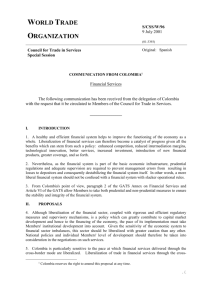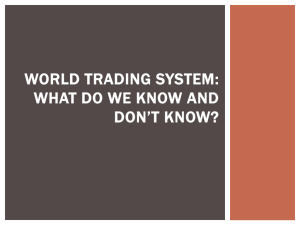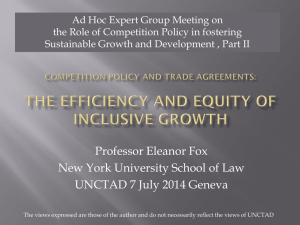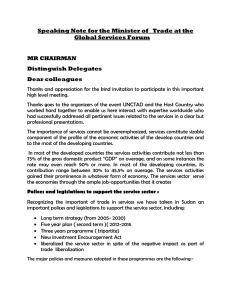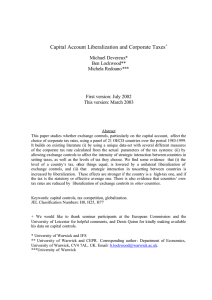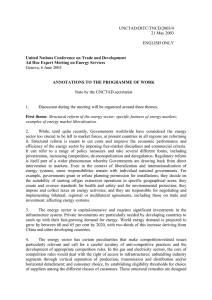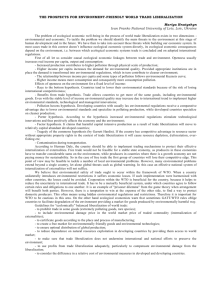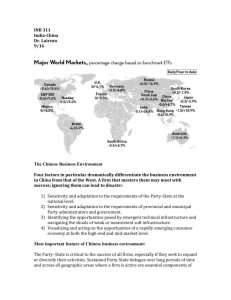19 March 2005 BIS/RIETI/BOC Conference Beijing
advertisement
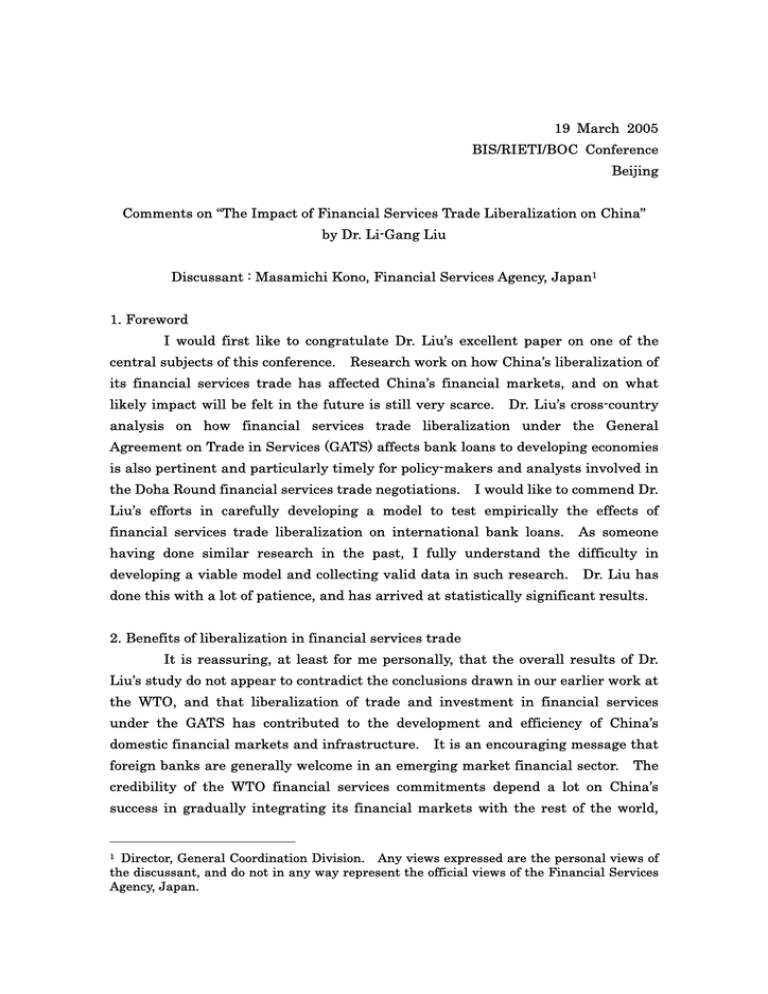
19 March 2005 BIS/RIETI/BOC Conference Beijing Comments on “The Impact of Financial Services Trade Liberalization on China” by Dr. Li-Gang Liu Discussant : Masamichi Kono, Financial Services Agency, Japan1 1. Foreword I would first like to congratulate Dr. Liu’s excellent paper on one of the central subjects of this conference. Research work on how China’s liberalization of its financial services trade has affected China’s financial markets, and on what likely impact will be felt in the future is still very scarce. Dr. Liu’s cross-country analysis on how financial services trade liberalization under the General Agreement on Trade in Services (GATS) affects bank loans to developing economies is also pertinent and particularly timely for policy-makers and analysts involved in the Doha Round financial services trade negotiations. I would like to commend Dr. Liu’s efforts in carefully developing a model to test empirically the effects of financial services trade liberalization on international bank loans. As someone having done similar research in the past, I fully understand the difficulty in developing a viable model and collecting valid data in such research. Dr. Liu has done this with a lot of patience, and has arrived at statistically significant results. 2. Benefits of liberalization in financial services trade It is reassuring, at least for me personally, that the overall results of Dr. Liu’s study do not appear to contradict the conclusions drawn in our earlier work at the WTO, and that liberalization of trade and investment in financial services under the GATS has contributed to the development and efficiency of China’s domestic financial markets and infrastructure. It is an encouraging message that foreign banks are generally welcome in an emerging market financial sector. The credibility of the WTO financial services commitments depend a lot on China’s success in gradually integrating its financial markets with the rest of the world, 1 Director, General Coordination Division. Any views expressed are the personal views of the discussant, and do not in any way represent the official views of the Financial Services Agency, Japan. and in developing a viable and dynamic financial services sector capable of supporting sustained economic growth. China is, without exaggeration, a role model for many emerging market countries in this respect. 3. The risk of liberalization of capital flows On the other hand, policymakers in emerging market economies are cautioned by Dr. Liu that “once they open up their financial services trade for foreign competition, they may also invite more capital flows to their economies, which in turn will tend to render the existing capital control regime less effective.” He then goes on to point out that liberalization could lead to a loss of the independence of monetary policy, or if this is not acceptable, the adoption of a flexible exchange rate. Since, the activities of “vulture funds” is still a much-discussed topic even in Japan, the perceived danger of uncontrolled capital flows bringing devastation to an open financial market cannot be easily ignored. But on the other hand, more often than not, it is probably misguided policy that caused financial markets to crumble, and international investors were only there to benefit from the circumstances. markets Such instances may only prove the basic truth that financial require appropriate prudential regulation and supervision, and liberalization of financial services trade needs to be well-programmed and appropriately sequenced. As I have argued elsewhere, the GATS itself requires only limited liberalization of capital movements in the context of financial services trade liberalization. Commitments to cross-border trade liberalization (mode 1) require the liberalization of capital inflows and outflows which are an "essential part of the (liberalized) service". Regarding commercial presence, the GATS rules require the liberalization of capital inflows which are "related to the supply of the service" without specifying in more detail whether this refers only to capital and equipment to "set up shop" or whether this also includes capital inflows related to service provision.2 Capital outflows related to the supply of services by foreign establishments do not have to be liberalized under GATS.3 Even as liberalization of financial services trade under the GATS may result in an 2 See GATS Article XVI, Footnote 8. What constitutes an "essential part of the service" for mode 1 trade and an "inflow related to the supply of the service" under mode 3 trade is not further specified. 3 This provision may also constrain capital inflows: if the repayment of a loan from abroad arranged through a foreign affiliate is restricted due to controls on capital outflows, this may discourage such loans. increase in the amount of cross-border capital flows, one should not jump to the conclusion that such liberalization would necessarily lead to volatile capital flows causing a financial crisis, if proper and sound prudential policy is implemented. 4. Appropriate sequencing of liberalization Hence, when we wish to draw upon China’s recent experience in harnessing the benefits of financial services trade liberalization and attempt to apply the strategy to other emerging markets, we should bear in mind that there are varying degrees and phases of liberalization, and that some should be given priority over others in the early stages of development. Full capital account liberalization is required when a country wishes to become a regional financial center, but it is not immediately recommended for an emerging market in its early stages of development. This is the basic thought behind our paper “How does financial services trade affect capital flows and financial stability?” (Kono, M. and Schuknecht, L., 2000) referred to by Dr. Liu. When we started to write our paper back in 1998, the intention was to persuade developing country policymakers to make liberalization commitments without fear of being forced to liberalize everything at one time, but were at the same time somewhat concerned that certain countries may seize upon such arguments for carefully-sequenced liberalization in order to delay much-needed liberalization of their financial services trade, and try not to make far-reaching commitments in the WTO context. necessary, but appeared too powerful. The prudential carve-out4 was Essentially, we wished to allay or remove any fear of being forced to liberalize everything at all cost, but at the same time had to caution against too much “prudence”. All countries have the right to take necessary prudential measures, and appropriately sequence their liberalization commitments, but they should not be used as a means of protecting the status quo. Regulators need to be aware that prudential measures when applied arbitrarily or without reasonable ground in the context of supervisory policy would be tantamount to protective measures, and would result in a forgoing of the benefits that can be derived from competitive and efficient financial markets. To facilitate the task of regulators to develop sound and effective prudential policy, ongoing efforts to develop international standards in financial supervision at the Basel Committee, IOSCO, IAIS and elsewhere are 4 GATS Annex on Financial Services, paragraph 2. strongly encouraged. With global financial liberalization gathering pace, there is a growing need for such international standard setters to understand and coordinate with financial services trade rules. The all important principle of the WTO, progressive liberalization, needs to be backed by sound domestic regulation, developed in conformity with international standards. 5. Issue for further consideration Going forward, we need to consider how a country can arrive at a policy of optimal sequencing of liberalization commitments and appropriate prudential measures. Traditionally, there has been a difference of opinion on this subject between trade negotiators and financial regulators. Having been on both sides of this divide for most of my professional career, I would caution against too much prudence, as regulators have a natural tendency to be conservative, even if they are not driven by an intention to protect domestic interests. But on the other hand, financial regulators have a duty to protect the consumers of financial services and to secure the integrity and stability of the financial system, and cannot subscribe to what one may call the “market fundamentalist school” which might argue against government intervention or regulation in the markets, in the name of efficiency.5 In my country, Japan, it took more than ten years to finally overcome the serious non-performing bank loan problem, which came close to starting a financial crisis in a number of instances. In the aftermath of the bubble economy, an unfortunate combination of gradual financial market liberalization and slow phasing-in of disclosure/accounting rules led to significant policy lags, and resulted in a large clean-up bill on the taxpayer. It is our pleasure today that we can declare a change of phase in our financial policy, that we are finally able to shift the focus of policy from crisis prevention to securing long-term growth and stability. Returning to normal times, partial protection of deposit insurance will be fully implemented from 1 April this year. I hope China will be able to learn from such past experiences of other countries, and speed up reform of its financial markets, fully embracing the principles of transparency and accountability. I think the best advice I can provide to China’s next generation of regulators is to conduct its financial market reforms in a speedy and transparent manner. The WTO process provides an excellent opportunity for China to test its policies in a multilateral, fair and open forum. 5 Efforts of bank regulators to introduce market-oriented bank capital requirements have recently borne fruit in the form of Basel II.
